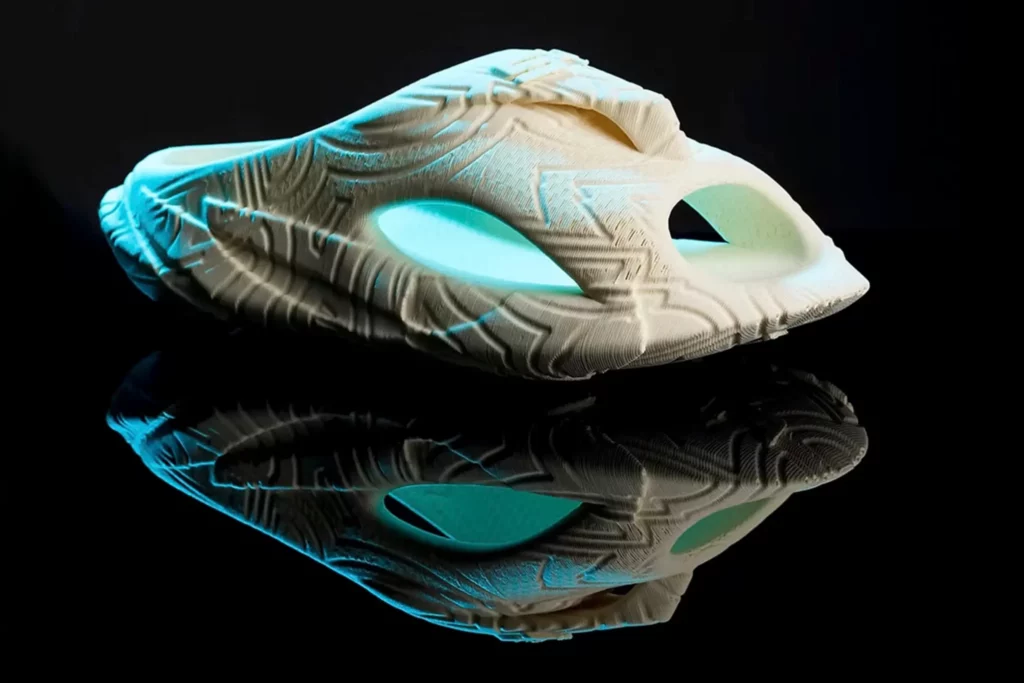The footwear industry is stepping into a new era, thanks to Syntilay, a pioneering company that seamlessly merges artificial intelligence (AI) with 3D printing to create bespoke footwear solutions. With a mission to transform how consumers experience comfort, style, and sustainability, Syntilay has introduced a line of custom-fit slides that represent the future of personalized design. Backed by notable figures such as Joe Foster, co-founder of Reebok, and Kevin Harrington, an original “Shark” on Shark Tank, Syntilay is set to disrupt the traditional footwear market.
Table of Contents
A Revolutionary Approach to Design
At the core of Syntilay’s innovation is its integration of AI-driven design tools and human creativity. The process begins with AI generating initial concepts based on various parameters, including ergonomic data, aesthetic trends, and material properties. These AI-created designs are then refined by human designers, who ensure the final products balance form and function. This collaboration results in unique textures, patterns, and shapes that not only look striking but also enhance the footwear’s performance and comfort.
By leveraging AI, Syntilay accelerates the design phase, allowing for rapid prototyping and greater adaptability to consumer preferences. The creative synergy between technology and human expertise positions the company at the forefront of the modern footwear industry.
Precision and Customization with 3D Printing
Syntilay’s use of 3D printing technology takes personalization to an entirely new level. The journey to the perfect fit begins with a mobile app that scans the user’s feet to capture precise measurements. This data is then used to create custom-fit slides that cater to each individual’s unique anatomy, ensuring maximum comfort and support.
Unlike traditional manufacturing methods, which often result in excess material waste and limited customization, 3D printing allows Syntilay to produce each pair of shoes on-demand. This approach minimizes waste and reduces production times, making the process both efficient and environmentally responsible.
Sustainability at the Forefront
Syntilay’s commitment to sustainability is evident in every aspect of its operations. The company’s 3D-printed slides are made using eco-friendly materials that are 100% recyclable. At the end of their lifecycle, customers can return the shoes, which are then processed and transformed into new products. This closed-loop system not only reduces waste but also aligns with the growing demand for sustainable consumer goods.
In addition to its recycling initiatives, Syntilay’s reliance on additive manufacturing further reduces its environmental footprint. Traditional footwear manufacturing often involves complex supply chains and significant energy consumption. By localizing production and utilizing on-demand printing, Syntilay significantly cuts down on transportation emissions and energy use.
A Fusion of Style and Functionality
While sustainability and customization are key pillars of Syntilay’s brand, the company also prioritizes aesthetics and performance. Available in five colors, the slides are designed to cater to a wide range of style preferences. The unique patterns and textures created through AI-guided design add a futuristic touch, appealing to tech-savvy consumers who value innovation.
Each pair of slides is not only visually appealing but also engineered for durability and comfort. The 3D-printed structure provides optimal support, while the use of advanced materials ensures flexibility and resilience, making them suitable for everyday wear.
Overcoming Challenges in Manufacturing
The journey to creating Syntilay’s revolutionary footwear was not without its challenges. Transitioning from concept to production required extensive research and development, particularly in calibrating 3D printers to achieve consistent quality. Material experimentation played a crucial role in balancing durability, comfort, and environmental impact. Misprints and technical setbacks were common in the early stages, but the team’s perseverance and innovative problem-solving ultimately led to the successful realization of their vision.
Collaboration was another key factor in Syntilay’s success. By working closely with experts in AI, 3D printing, and sustainable materials, the company was able to bridge the gap between technology and craftsmanship, delivering a product that embodies cutting-edge innovation.
Affordability and Accessibility
Syntilay’s custom-fit slides are priced at $149.99, striking a balance between accessibility and premium value. This pricing reflects the company’s commitment to making advanced, sustainable footwear available to a broader audience while maintaining high-quality standards.
The mobile app, a cornerstone of the customization process, is designed to be user-friendly, enabling customers to easily scan their feet and order their personalized slides. This streamlined experience underscores Syntilay’s goal of making bespoke footwear an attainable reality for all.
Shaping the Future of Footwear
Syntilay’s innovative approach has far-reaching implications for the footwear industry and beyond. By integrating AI and 3D printing, the company is setting a new standard for how products can be designed, manufactured, and consumed. Its emphasis on sustainability and customization resonates with a growing demographic of environmentally conscious and tech-savvy consumers.
Looking ahead, Syntilay aims to expand its product line and explore new applications for its technology. The company’s vision includes leveraging its expertise to create other custom-fit wearables, further blurring the line between fashion and technology.
Conclusion
Syntilay is more than just a footwear company—it’s a testament to the transformative power of innovation. By combining AI and 3D printing, the brand has redefined what it means to create custom footwear, offering a unique blend of style, functionality, and sustainability. As the world moves toward more personalized and eco-friendly solutions, Syntilay is leading the charge, proving that technology and creativity can work hand in hand to shape a better future.


